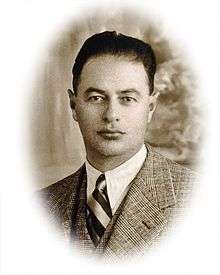Árpád Weisz
Árpád Weisz (Hungarian pronunciation: [ˈaːrpaːd ˈvɛis]; also spelt Veisz; 16 April 1896 – 31 January 1944) was a Hungarian Olympic football player and manager. Weisz was Jewish,[4][2] and was killed with his wife and children by the Nazis during The Holocaust in World War II at Auschwitz.[5]
 | |||
| Personal information | |||
|---|---|---|---|
| Full name | Árpád Weisz | ||
| Date of birth | 16 April 1896 | ||
| Place of birth | Solt, Austria–Hungary | ||
| Date of death | 31 January 1944 (aged 47) | ||
| Place of death | Auschwitz-Birkenau, Germany | ||
| Playing position(s) | Left winger[1][2] | ||
| Senior career* | |||
| Years | Team | Apps | (Gls) |
| 1922–1923 | Törekvés SE | ? | (?) |
| 1923–1924 | Makabi Brno | ? | (?) |
| 1924–1925 | Alessandria | 6 | (1) |
| 1925–1926 | Internazionale[3] | 10 | (3) |
| National team | |||
| 1922–1923 | Hungary | 7 | (0) |
| Teams managed | |||
| 1926–1928 | Internazionale | ||
| 1929–1931 | Internazionale | ||
| 1931–1932 | Bari | ||
| 1932–1934 | Internazionale | ||
| 1934–1935 | Novara | ||
| 1935–1938 | Bologna | ||
| 1938–1940 | Dordrecht | ||
| * Senior club appearances and goals counted for the domestic league only | |||
Career
Playing career
Weisz played club football as a left winger in Hungary for Törekvés SE,[2] in Czechoslovakia for Makabi Brno, and in Italy for Alessandria and Internazionale.[6]
Weisz earned seven international caps between 1922 and 1923, and was a member of the Hungarian squad at the 1924 Summer Olympics in Paris.[6] A serious injury cut short his playing career.[1]
Coaching career
After retiring as a player in 1926, Weisz became an assistant coach at Alessandria before moving to F.C. Internazionale Milano, where at the age of 34 he won one championship in the 1929–1930 season.[2][7] Weisz had three separate spells as manager of Inter, 1926–28, 1929–31, and 1932–34, managing Giuseppe Meazza among his players. He also coached Bari, Novara and Bologna, where he won two league titles (in 1936 and 1937) before he was forced to flee Italy with his wife and two children following the enactment of the Italian Racial Laws.[8][9][10] Weisz finished his career by coaching FC Dordrecht in the Netherlands,[9] leaving in 1940 following the outbreak of the Second World War.[6]
Four years later he was arrested by the SS and killed by the Nazis at Auschwitz concentration camp, with his family of four (including his wife Elena, his son Roberto, and his daughter Clara) when they were gassed immediately upon entering Birkenau.[7][5]
External links
References
- Costantino, Sostene (27 February 2018). "Arpad Weisz: the Auschwitz victim who helped shape the idea of modern football". These Football Times. Retrieved 27 February 2019.
- The Greatest Comeback: From Genocide To Football Glory: The Story of Béla ... - David Bolchover
- Arpad Veisz | Players | F.C. Internazionale | inter.it
- http://www.thejc.com/news/world-news/111381/italy-rediscovers-a-hero-football-lost-shoah
- Who Betrayed the Jews?: The Realities of Nazi Persecution in the Holocaust - Agnes Grunwald-Spier
- Remembering the remarkable Arpad Weisz - Football - Eurosport
- "Who was Arpad Weisz?" | NEWS
- Bologna pay tribute to Holocaust victim Arpad Weisz | Paddy Agnew
- Erbstein: the triumph and tragedy of football's forgotten pioneer - Dominic Bliss
- The Italians - John Hooper